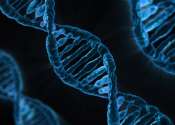An under-researched mechanism in the fast-moving field of epigenetics
A key epigenetic mark can block the binding of an important gene regulatory protein, and therefore prohibit the gene from being turned off, a new UNSW study in CRISPR-modified mice—published this month in Nature Communications—has ...









